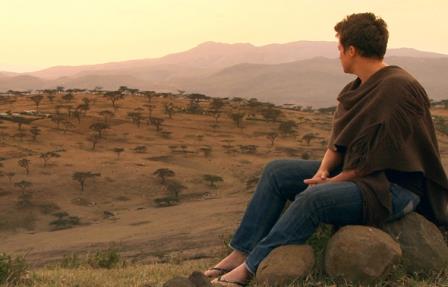Charlotte Campbell-Stephen in 'I Will Not Be Silenced'.
Australian aid worker Charlotte Campbell-Stephen was gang raped in Nairobi in 2006.
I Will Not Be Silenced, screening tomorrow night at 9.30 on ABC2, is the story of Campbell-Stephen's quest for justice and her campaign for women’s rights in Kenya.
The documentary was directed by veteran filmmaker Judy Rymer (Message from Moree, All Points of the Compass, Frank and Daz Take On The World, Poles Apart: The Blue Poles Controversy) and produced by Rymer and Lois Harris.
Campbell-Stephen approached Rymer after she'd been in court for about a year.
"Someone had told her to come to me because they thought I'd be the right person to do a story on her, but at the time what she really had in mind was to take some women healers back to work with the women in [Nairobi's] Kibera slum, and that was not the story that I could do", Rymer told IF.
"So I kept a watch on what was going on, and about three and half years in Charlotte put out a press release. I was with my co-producer Lois Harris, and I said 'you know, we really should be making this film', and Lois said 'let's do it'.
"Two weeks later we were in Nairobi shooting the continuance of the court case. And I think we all thought this was the final throes of it and it was going to wrap up, and it went on for another four years".
Trying to nail down a shooting schedule proved difficult.
"We went backwards and forwards and it was very harrowing, because it was extremely difficult to try and pinpoint when to go. We'd get over there, [and] they'd change the [court] dates. It was a really hard shoot to call, but luckily we mostly got it right in the end".
Rymer and her Australian crew got off the plane and were taken straight to the site of Campbell-Stephen's rape, where "Charlotte walked [us] through it". This passage opens the film.
"We didn't resile from discussing the rape and we dealt with it right at the start, and I think that cemented Charlotte's relationship not only with me but with the crew", said Rymer.
"I've never seen anybody who had less self pity than Charlotte. I was impressed by what she was trying to do; seeking her own justice but also establishing a route for justice for women in Kenya. Certainly in the Kibera slum, the women have no voice and no way of taking their petitions to court".
Throughout the shoot, the filmmaking team "did some assemblies and cut some trailers, because we were trying to get additional funding", but only started cutting properly after all the footage had been collected.
Two versions were cut by editors Paul Hamilton and Michael Horton – one feature-length for festivals and a shorter version for TV.
"We hope that the surgery hasn't been damaging and the patient hasn't died. They're different, but I think both versions are strong".
One of the first people Rymer showed the film to was Nairobi's chief justice, who had "permitted us to film, even when he obviously knew that the case was not going so well".
"He's a reformer, and very keen to change the delivery of justice in the judiciary. He was very moved and distressed by the film, and he insisted that his four hundred senior judges sit and watch it".
"It's now become part of the training for newly appointed magistrates servicing the courts where rapes are heard, and Jane – one of the characters from the Kibera slum – now does Q&A's after each of those screenings. That's a fantastic result for us in terms of the film's potential for advocacy".
The film has spent the last twelve months touring to festivals, opening at IDFA.
"I remember going to do a tech-check in the big theatre in Amsterdam, and saying to Lois, 'if only ten people turn up, it's going to be really strange in here', because it was an 800-seater".
"But it was full, and that was incredibly exciting. We'd taken the risk and done a 5.1 mix, and it just sounded and looked as good as we could get it".
After the documentary screens on ABC2 tomorrow night, Rymer is unsure of its future.
"What I hope is that there may be non-broadcast potential for it, and the possibility of Charlotte being able to accompany the film and talk to it, because I think it works very well to open up the subject of rape with women who find it difficult to discuss".
Watch the trailer here.



